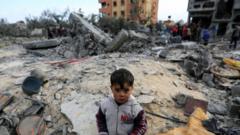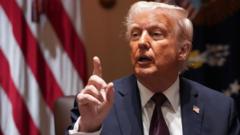Iran shows willingness to engage with the U.S. in a nuanced manner about its nuclear program while emphasizing its longstanding policy against direct negotiations.
Iran's Conditional Openness to Indirect Talks With the U.S. Following Trump's Letter

Iran's Conditional Openness to Indirect Talks With the U.S. Following Trump's Letter
Tehran considers indirect negotiations a possibility while maintaining a stance against direct talks amid pressure from the U.S.
Iran's foreign minister, Abbas Araghchi, has indicated that while direct negotiations with the United States are off the table under current conditions, there remains a possibility for indirect talks. This statement comes as a response to a letter from President Trump urging for negotiations to address Iran’s nuclear program. Reportedly, the letter was delivered to Tehran through Oman.
In a careful positioning, Iran has not outright rejected the idea of dialogue. Kamal Kharazi, a key adviser to Supreme Leader Ayatollah Ali Khamenei, remarked that while the Islamic Republic is not shutting all opportunities for discussions, they prefer indirect communication until the pressures from the U.S., including military threats, are lifted.
The official diplomatic relations between the two nations have been severed since the Islamic Revolution in 1979; however, they had previously engaged in both direct and indirect talks concerning critical issues such as the nuclear program, detainee swaps, and regional conflicts. In his comments, Minister Araghchi noted that Iran had submitted a comprehensive response to Trump's inquiries, elaborating on various concerns surrounding the Middle East's security landscape.
Araghchi highlighted that Iran's strategy disallows direct talks amid what they characterize as "maximum pressure" tactics by the U.S., which often include economic sanctions and military posturing. The door remains ajar for indirect negotiations, a method that has been utilized previously, reflecting Iran's complex diplomatic stance amid ongoing tensions.





















